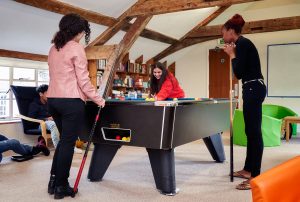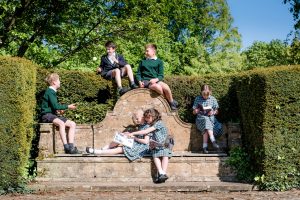State boarding school leaders met with BSA Honorary President Lord Black, MPs and parliamentary researchers at the House of Lords on Wednesday 12 November to highlight the national importance of the state boarding sector and call for greater recognition within government.
Nine state boarding schools were represented, including Duke of York’s Royal Military School, Lancaster Royal Grammar School, Haberdasher’s Adams, Royal Alexandra & Albert School, Old Swinford Hospital, Burford School, Steyning Grammar School, SE Trust (Wymondham) and Hockerill Anglo-European College.
Alex Foreman, Principal of The Duke of York’s Royal Military School and Chair of the State Boarding Forum (SBF), led the event, describing state boarding as, “Quietly transforming lives across Britain, yet still one of the best-kept secrets in education.”
There are currently 30 state boarding schools in the UK educating approximately 4,700 boarders. Boarding fees in state boarding cover only the residential element, accommodation, meals and pastoral care, while the education is fully state-funded. This makes state boarding a markedly more affordable option compared with the independent sector.
Mr Foreman emphasised that while affordability is a strength, it has also led to the damaging misconception that state boarding is a “second tier” alternative. In reality, state boarding schools consistently deliver pastoral care to a very high standard, with academic outcomes that match or exceed many independent settings. Pupils at state boarding schools achieve, on average, half a grade higher per subject than pupils nationally, with a significantly higher proportion achieving Grade 5+ in English and Maths.
Leaders also highlighted the distinctive impact of state boarding: the stability, structure and pastoral expertise of boarding combined with high-quality state education. For many families, including military families supported by the Continuity of Education Allowance (CEA) and children who benefit from a structured, nurturing environment, state boarding is not simply an option, but a life-changing opportunity.
To bring this to life, two 17-year-old students from The Duke of York’s Royal Military School addressed the room, offering powerful first-hand testimonies and quite rightly, stole the show.
Sam, a student from a service family, spoke about affordability and stability:
“Independent boarding would have been completely out of reach for us, even with CEA. With three siblings, it simply wasn’t possible. State boarding turned something that could have been a privilege for a few into a real, sustainable opportunity for families like mine.”
Ciara, a civilian pupil, reflected on returning to state boarding after leaving at the end of Year 11:
“At first, I pushed against everything the school tried to give me. I left after Year 11, but within six weeks at my local college I realised what I had thrown away. I asked to come back. Since then, I’ve embraced every part of school life, and this September I became a prefect. That would never have happened without the support and community of state boarding.”
A key discussion point was the urgent need for greater engagement and visibility from the Department for Education. State boarding currently sits between policy areas, with no dedicated lead within the DfE. Leaders called for a named official responsible for state boarding, ensuring that the sector is understood, supported, and integrated within wider education strategy.
Mr Foreman urged MPs to help bring state boarding into the national vocabulary so that parents, schools and local authorities understand the value, availability, and distinctiveness of this provision.
Lord Black welcomed the contributions and praised state boarding’s important role in broadening opportunity and raising aspirations.
The meeting concluded with a shared commitment to strengthen the voice of the state boarding sector and to deepen engagement with policymakers. Leaders expressed optimism that raising awareness will allow more pupils to access the stability, support and life-changing opportunities state boarding provides.
BSA continues to work closely with member schools to elevate the profile of state boarding and support collaborative efforts to grow and secure the sector’s future.
Categories: Duke of York Military School Haberdashers’ Adams Hockerill Anglo-European College Lancaster Royal Grammar School Old Swinford Hospital School Royal Alexandra & Albert School Sector News Steyning Grammar School Wymondham College







